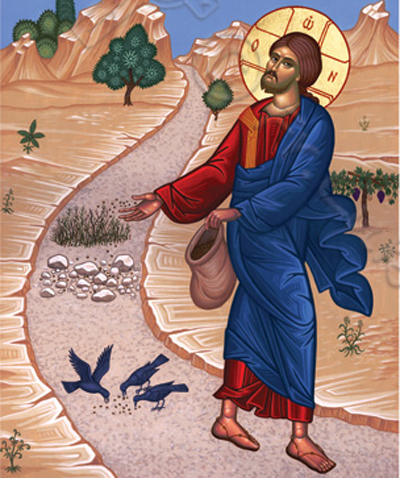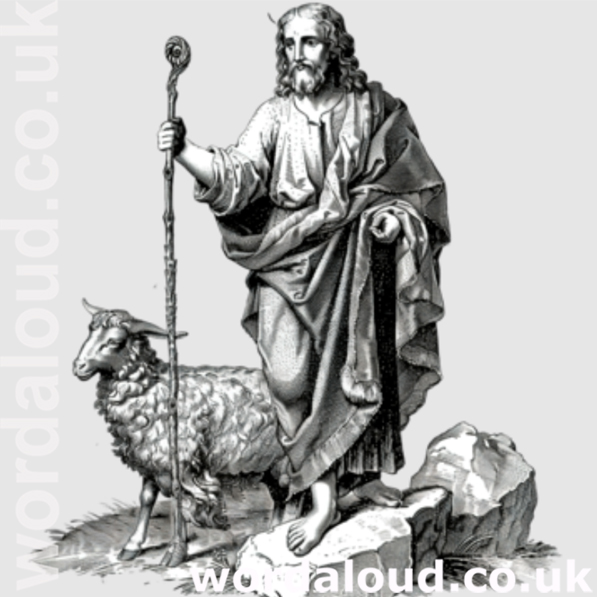Christian Art | Meaning Of Parables | Love Revealed By Jesus Christ
Matthew 13: 36-43 – Week 17 Ordinary Time, Tuesday (King James Audio Bible KJV, Spoken Word)
36 Then Jesus sent the multitude away, and went into the house: and his disciples came unto him, saying, Declare unto us the parable of the tares of the field.
37 He answered and said unto them, He that soweth the good seed is the Son of man;
38 The field is the world; the good seed are the children of the kingdom; but the tares are the children of the wicked one;
39 The enemy that sowed them is the devil; the harvest is the end of the world; and the reapers are the angels.
40 As therefore the tares are gathered and burned in the fire; so shall it be in the end of this world.
41 The Son of man shall send forth his angels, and they shall gather out of his kingdom all things that offend, and them which do iniquity;
42 And shall cast them into a furnace of fire: there shall be wailing and gnashing of teeth.
43 Then shall the righteous shine forth as the sun in the kingdom of their Father. Who hath ears to hear, let him hear.
Jesus presents to his listeners an ideal of Christian purity, upon which we must act. There is a judgement, and there the sowings of the evil one will be burnt. It is that within us which is with God, with Jesus, which will shine for all eternity.
These are the fruits of what was originally sown by God. Our failings came after, when we have sinned, giving way, usually in small yet insidious ways, to the wiles of Satan. Still, amidst the tangling together of the weeds and of the good wheat in our lives, our true conscience remains active, calling us to Jesus, shining a light on our own souls, which clearly displays to us that which is good and that which evil. We are enabled by God, within the economy of salvation, to discern the good, and to live accordingly.
Jesus’ warning in these Gospel verses, as Jesus explains the parable, is also a promise. It is not we who are the weeds to become that which is to be burnt; rather we are sown as the good wheat. Christ goes to his cross, to his throne, to be our gateway to God and heaven, to take that with him which is contaminate within ourselves – to take the weeds with which we may have been smothered, as the servant of the Lord of the field, so that all that may remain of ourselves for us to offer to God may be good wheat. Christ teaches this parable as he goes to die for us, to take away the sins of the world.
No matter the difficulties of this life, the promise remains. Our good works, our best selves, our true selves, are called to be with God in heaven. The angels will gather us. Then shall the righteous shine forth. All that is required is to believe in Jesus and to live in fraternal knowledge of Jesus, to love and give our lives to God.
Concluding Prayer
HOW long wilt thou forget me, O LORD? for ever? how long wilt thou hide thy face from me?
2 How long shall I take counsel in my soul, having sorrow in my heart daily? how long shall mine enemy be exalted over me?
3 Consider and hear me, O LORD my God: lighten mine eyes, lest I sleep the sleep of death;
4 Lest mine enemy say, I have prevailed against him; and those that trouble me rejoice when I am moved.
5 But I have trusted in thy mercy; my heart shall rejoice in thy salvation.
6 I will sing unto the LORD, because he hath dealt bountifully with me. (Psalm 12/13)

![]()
King James Audio Bible | Endnotes
Parable Of The Weeds | The Devil And The Angels | End Of The World
The parable of the weeds, also known as the parable of the tares of the field, is one of the many parables of Jesus that holds a significant place in the teachings of Christianity. In this parable, Jesus compares the Kingdom of Heaven to a field in which a man sows good seed, but while he is asleep, an enemy sows weeds (tares) among the wheat. When the wheat begins to grow and produce grain, the weeds also become noticeable. The servants ask the owner of the field if they should go and pull out the weeds, but the owner tells them to wait, saying, ‘Let both grow together until the harvest, and at the time of harvest I will say to the reapers, “First gather the tares and bind them in bundles to burn them, but gather the wheat into my barn.”’ (Matthew 13:30, KJV)
The parable is often interpreted as a warning against judging others or trying to separate the righteous from the wicked too soon. Christians are reminded to trust in God’s judgment and be patient, as it is only He who knows the true nature of every person. The parable also serves as a reminder that evil will ultimately be punished and righteousness will be rewarded, emphasizing the importance of righteous life in accordance with the teachings of the Church of Jesus Christ.
Additionally, the parable of the weeds can be seen as a warning against complacency in one’s faith. Just as the weeds can easily mix in with the wheat, so too can sin and evil mix in with the good in a person’s life. The parable emphasizes the importance of being vigilant and constantly working to root out evil and cultivate righteousness through Christian prayer and other spiritual practices.
In the New Testament, the parable of the weeds is linked to the end times and the final judgment, with the harvest serving as a metaphor for the end of the world and the separation of the righteous and the wicked. The wheat symbolizes the righteous, while the weeds represent the wicked. At the end of the world, the wheat will be gathered into God’s barn, representing entrance into Heaven, while the weeds will be burned, representing damnation in Hell. The Christian cross and other Christian gifts can serve as a reminder of the sacrifice of Jesus on the cross and the ultimate victory of good over evil.
An understanding of the meaning of parables is that within the context of engagement with the parables we are present with Jesus in the Garden of Gethsemane – toward crucifixion of Jesus and hence redemption.







